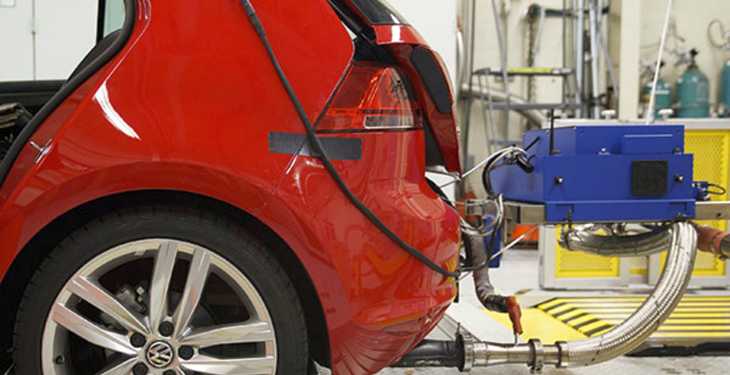While the Dieselgate scandal still roars on, the European Union may be about to water down new CO2 limits for cars at the behest of German automakers.
The Commission has been preparing a proposal to set new limits on car CO2 emissions for the period after 2020. Drafts of the proposal circulating in the Commission stipulate a 25-35 percent emissions reduction target for 2030, with an interim target in 2025.
The drafts also call for automakers to be forced to produce a minimum of 15-20 percent zero-emission vehicles (ZEVs), meaning mostly electric cars, by 2030.
The proposal is due to be unveiled on 8 November. But in the run-up to that date, a barrage of lobbying from German automakers could kill the ZEV mandate and the 2025 interim target.
Matthias Wissmann, head of the German auto lobby group VDA, spoke on the phone to Martin Selmayr, the powerful chief of staff to Commission President Jean-Claude Juncker, on Thursday. He also spoke to EU climate commissioner Miguel Arias Cañete on Friday.
A Commission spokesperson confirmed that the calls took place.
Following the phone calls, a meeting of commission cabinets on Tuesday discussed an idea to water down the proposal by removing the interim 2025 target and either ditching the ZEV mandate or making it toothless.
The Commission spokesperson said the phone calls were only one example of a “broader stakeholder engagement by the Commission aimed at listening to the views of all interested parties.” VDA was not available for comment because of public holidays in Germany.
However, the environmental lobby group Transport & Environment sees something more nefarious. They say they have seen this pattern of last-minute interventions by German automakers in Commission car proposals several times over the past years, with Selmayr and German commissioner Gunther Oettinger getting involved at the last moment.
They note that an interim 2025 target and a robust electric vehicle mandate have enough support to pass in the European Council. Last week Austria, Belgium, the Netherlands, Portugal, Ireland, Luxembourg and Slovenia wrote a letter the Commission calling for a 40 percent target for 2030. France and Sweden have sent their own letter to the same effect, according to Euractiv.com.
The German government has been tight-lipped on the issue, perhaps still hesitant to lobby hard for their auto sector in the wake of the Dieselgate scandal. The new German coalition government is expected to commit to a 42 percent national emissions reduction target in transport, and a ZEV mandate would likely be needed to hit that target.
“Having failed to gain support from the German Government, the VDA has run to their German friends in the Commission to emasculate the Commission’s proposal for future car CO2 regulations,” says Greg Archer, a campaigner with T&E.
The VDA’s resistance comes even as individual automakers support the ZEV mandate. According to a leaked internal presentation, VW could support a ZEV mandate of 22 percent in 2025 and 34.5 percent in 2030, under certain conditions. Other automakers such as Nissan already produce more electric vehicles than the mandate would require.
But industry associations usually have to match the ambitions of their most conservative member. T&E believes a small group of automakers are driving the VDA lobbying.
“As the VW leak shows, carmakers can accept a ZEV mandate and targets more ambitious than the Commission is proposing,” says Archer. “But some European carmakers are fixated on preserving the market for dirty diesel in Europe for as long as possible, despite collapsing sales, in a desperate attempt to recoup their past unwise investments.”
A 2025 target would likely mean that the auto industry has to stop producing diesel cars very soon. No interim target would mean that they could continue producing diesel cars until 2025 and beyond. T&E says this would halve the CO2 savings of the proposal.
The College of Commissioners will take a final decision on the proposal on 8 November and then pass it on to the European Parliament and member states. Legislation is rarely changed by the Council to be more ambitious than the original Commission proposal.
